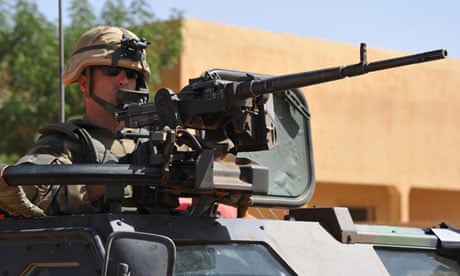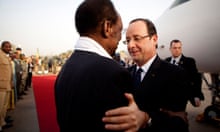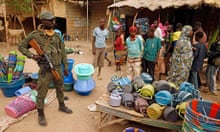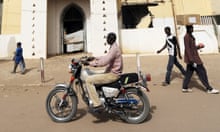French aircraft struck Islamic militant training camps and arms depots around Kidal and Tessalit in Mali's far north, defence officials said on Sunday, as the first convoy of food, fuel and parts to eastern Mali headed across the country.
The strikes also hit arms and fuel depots from Saturday night into the early hours of Sunday, according to army spokesman Colonel Thierry Burkhard. "It was an important aerial operation to the north of the town Kidal and in the Tessalit region where we targeted logistical depots and Islamist training camps ... some 20 sites," said Burkhard. He said 30 planes were used in the operation , including Mirage and Rafale jets.
Although troops have succeeded in ousting the rebels from the three main northern cities they occupied, the aerial operation highlights the fact that the French still see militants in the northern area near the border with Algeria as a threat. "Here, there are still various Islamist groups like the MUJAO [Movement for Unity and Jihad in West Africa] and Ansar Dine," he said.
As the first supply convoy for the eastern town of Gao since the conflict began neared its destination, crowds thronged the roads screaming, "Vive la France!" and old men in long flowing robes on bicycles waved as soldiers passed by. Even camels grazing in acacia trees perked up as the three-mile-long, 62-vehicle convoy lumbered by.
Still about 120 miles south-west of Gao on Sunday, it proceeded slowly because of concerns about landmines between Gossi and Gao. Four Malian soldiers died last week when one exploded, and two others have been found in the vicinity since, said a Lieutenant Emmanuel, who gave only his first name in keeping with French military protocolone officer. The convoy, carrying food, fuel and spare parts for the French military for 800 miles, underlines the logistical difficulties facing the mission in Mali.
"The distances are very long. In Afghanistan we could do it in a day. Now, it's eight days round trip here," said Emmanuel. The convoy is bringing a 15-day supply, he said.
Still, the successes of the operation were seen alongside the small villages where signs of life were returning to normal, and where there was no visible presence of the Islamic rebels who imposed harsh rule for months.
The approach of the convoy and the use of aerial assaults come three weeks after France unilaterally launched its military intervention – and, significantly, just hours after President François Hollande left Mali soil.
On Saturday he visited Timbuktu to a liberator's welcome. Thousands of people stood elbow to elbow behind a perimeter line, hoisting the homemade French flags they had prepared for Hollande's arrival in the northern desert city that French troops liberated last week after 10 months of control by al-Qaida-linked groups.
He then flew to Bamako, the capital, where he spoke before boarding a plane back to Paris. He stressed the successes of the French intervention, but warned that threats of extremism will continue.
"Terrorism has been rejected. It has been chased, but not yet beaten," Hollande said.
France has said it eventually wants to hand over responsibility for the mission to the Malian army and other African counterparts. But, once the country's thousands of troops, fighter planes and helicopters leave, Mali's weak army and soldiers from neighbouring countries may be hard pressed to retain control of northern Mali's cities if the Islamic extremists attempt a comeback from their desert hideouts.
In an interview with the French weekly Le Journal du Dimanche, Malian minister of foreign affairs Hubert Tieman Coulibaly expressed the government's hope that the French military operation will carry on until the Islamists have no more weapons left.
"Faced with seasoned fighters whose arsenal must be destroyed, we wish the mission to continue," Coulibaly said. "Especially given how important the aerial dimension is."







